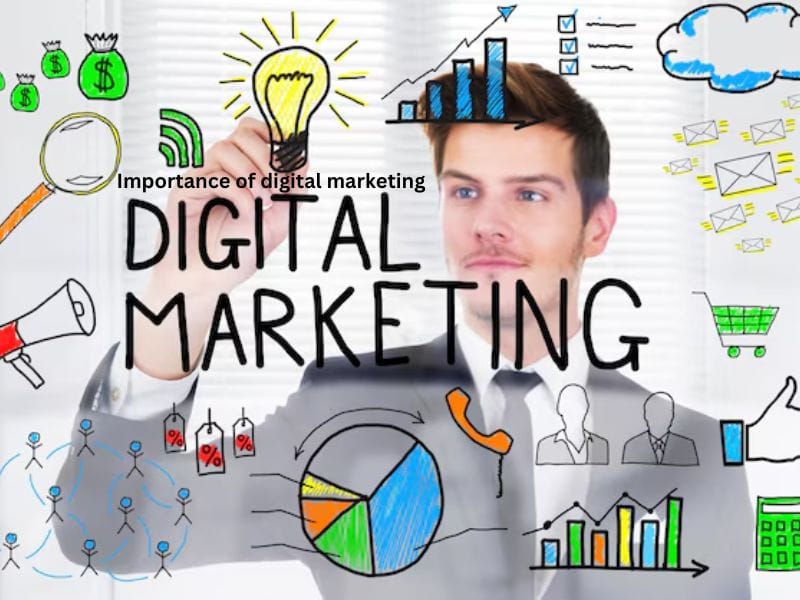Importance of Digital Marketing
Importance of Digital Marketing, Digital marketing has transformed how businesses operate and connect with their customers. In today’s fast-paced, technology-driven environment, it has become an indispensable tool for success. Whether you’re a small startup or a multinational corporation, embracing digital marketing strategies can propel your business to new heights. This comprehensive guide will delve into why digital marketing is crucial and how it can create unparalleled growth opportunities for your business.
Importance of Digital Marketing
1. What Is Digital Marketing?
Digital marketing refers to using online platforms and digital channels to promote products or services. It encompasses a wide range of tactics, including search engine optimization (SEO), social media marketing, email campaigns, content marketing, and more. Unlike traditional marketing, digital marketing allows businesses to target specific audiences, measure performance, and adjust strategies in real time.
Importance of Digital Marketing
2. Why Digital Marketing Is Essential in Today’s Era
The digital revolution has changed consumer behavior. People now spend a significant portion of their time online, browsing social media, searching for information, and shopping. This shift makes digital marketing a necessity rather than an option for businesses.
Importance of Digital Marketing
Here are key reasons why digital marketing is vital:
- Global Reach: It enables businesses to connect with audiences worldwide without the geographic constraints of traditional marketing.
- Cost-Effective: Compared to TV ads or print media, digital marketing offers a more affordable way to reach target customers.
- Data-Driven: Businesses can track performance metrics like website traffic, click-through rates, and conversions to refine strategies.
- Flexibility: From email campaigns to pay-per-click (PPC) ads, digital marketing offers diverse tools to suit any business size and budget.
Digital marketing empowers businesses to create personalized customer experiences, a crucial factor in today’s competitive market. Personalization builds trust and fosters brand loyalty, leading to higher conversion rates and repeat customers. Additionally, as more consumers rely on digital channels for information, businesses that fail to adopt digital marketing risk falling behind their competitors.
Digital marketing also bridges the gap between brands and consumers by enabling real-time communication. Through platforms like social media and email, businesses can respond to inquiries, resolve issues, and gather feedback, all of which enhance customer satisfaction. This level of accessibility strengthens customer relationships and boosts brand reputation.
Moreover, digital marketing provides a platform for storytelling. Brands can share their mission, values, and unique selling points through engaging content, videos, and social media posts. This not only humanizes the brand but also fosters emotional connections with the audience, further solidifying loyalty.
Importance of Digital Marketing
3. The Role of SEO in Digital Marketing
Search Engine Optimization (SEO) is the backbone of any digital marketing strategy. Why? Because SEO ensures that your business ranks higher on search engine result pages (SERPs), driving organic traffic to your website.
Benefits of SEO:
- Increased Visibility: High rankings improve your brand’s visibility.
- Trustworthiness: Websites that rank on the first page of search results are often seen as more reliable and credible.
- Higher ROI: Organic search results often yield better return on investment than paid ads.
Importance of Digital Marketing
To optimize SEO, focus on:
- Performing comprehensive keyword analysis: Keywords serve as the cornerstone of effective SEO. Understanding what your audience is searching for helps tailor content to their needs.
- Publishing high-quality, relevant content: Engaging content not only attracts visitors but also keeps them on your site longer, signaling search engines that your site provides value.
- Improving website speed and mobile-friendliness: Slow-loading or non-responsive websites lead to high bounce rates, negatively impacting your rankings.
- Building quality backlinks: Backlinks from reputable websites boost your site’s authority and credibility.
SEO is a continuous effort that demands consistent updates and vigilant monitoring. By staying informed about algorithm changes and adapting your strategy, you can maintain or improve your rankings over time.
Importance of Digital Marketing
4. Social Media Marketing: The Power of Engagement
Social media platforms like Facebook, Instagram, LinkedIn, and Twitter have become powerful tools for digital marketing. Why is social media so effective? Because it allows brands to engage directly with their audience in a conversational manner.
Key Advantages:
- Brand Awareness: Regular posts and ads ensure your brand stays top of mind.
- Customer Interaction: Platforms enable two-way communication, fostering trust and loyalty.
- Cost Efficiency: Social media advertising is relatively low-cost compared to other channels.
Tips for Success:
- Create visually appealing and shareable content: High-quality images and videos grab attention and encourage sharing, increasing reach.
- Post consistently to maintain audience interest: A consistent posting schedule keeps your audience engaged and informed.
- Use analytics tools to measure performance and adjust campaigns: Platforms like Facebook Insights and Instagram Analytics provide valuable data to refine your strategy.
Social media marketing also allows businesses to tap into trends and viral content, further amplifying their reach. By staying relevant and relatable, brands can connect with younger, tech-savvy audiences who are highly active on these platforms.
Importance of Digital Marketing
5. Content Marketing: Educating and Inspiring
Content marketing involves creating and sharing valuable, relevant, and engaging content to attract and retain an audience. It’s about providing solutions, building trust, and positioning your brand as an industry leader.
Popular Content Types:
- Blog posts: Informative and well-written articles attract organic traffic and establish expertise.
- E-books and whitepapers: These in-depth resources provide value and encourage email sign-ups for lead generation.
- Videos and infographics: Visual content is highly engaging and easily digestible.
- Podcasts: Audio content allows brands to share insights and connect with audiences on the go.
Why Content Marketing Matters:
- Builds Authority: High-quality content establishes you as a credible source in your field.
- Boosts SEO: Fresh, relevant content improves search engine rankings.
- Generates Leads: Content can guide potential customers through the sales funnel.
Content marketing also enhances brand storytelling. By sharing authentic stories and showcasing expertise, businesses can create emotional connections with their audience. This humanizes the brand and fosters a sense of community, encouraging long-term loyalty.
Additionally, content marketing is a cost-effective way to generate leads. Unlike traditional advertising, which can be intrusive, valuable content naturally attracts and engages potential customers. This approach not only builds trust but also encourages users to take action, such as subscribing to a newsletter or making a purchase.
Importance of Digital Marketing
6. Email Marketing: Staying Connected
Email marketing is one of the oldest yet most effective forms of digital marketing. With the ability to personalize messages and reach users directly, email marketing remains a powerful tool.
Benefits of Email Marketing:
- High ROI: It’s one of the most cost-effective methods to convert leads into customers.
- Personalization: Tailored emails create a more engaging user experience.
- Automation: Tools like Mailchimp or HubSpot allow you to automate campaigns for better efficiency.
Best Practices:
- Segment your audience for targeted campaigns: Divide your subscribers based on preferences, behavior, or demographics for more effective messaging.
- Use compelling subject lines to boost open rates: An enticing subject line grabs attention and encourages recipients to open your email.
- Include clear calls-to-action (CTAs): Make it easy for recipients to understand what you want them to do next, such as visiting a website or making a purchase.
Importance of Digital Marketing
7. Pay-Per-Click Advertising: Instant Results
PPC advertising involves paying for ad placements on platforms like Google Ads, Bing Ads, or social media. It’s an excellent way to gain visibility quickly.
Advantages of PPC:
- Quick Results: Unlike SEO, PPC delivers immediate traffic.
- Precise Targeting: Ads can be tailored to demographics, location, and behavior.
- Budget Control: Advertisers can set daily or monthly budgets to manage expenses.
Importance of Digital Marketing
To succeed with PPC:
- Use high-performing keywords: Target keywords that align with your audience’s search intent.
- Write compelling ad copy: An engaging ad copy increases click-through rates and conversions.
- Continuously monitor and optimize campaigns: Regular analysis and adjustments ensure maximum ROI.
Importance of Digital Marketing
8. Video Marketing: Captivating Audiences
Video marketing is dominating the digital landscape. Platforms like YouTube, TikTok, and Instagram Reels make it easier than ever to connect with audiences through video.
Why Video Works:
- High Engagement: Videos are more engaging and memorable than text or images.
- Versatility: They can be used for tutorials, testimonials, product demos, and more.
- SEO Benefits: Videos often rank well in search results.
Tips for Effective Video Marketing:
- Keep videos short and engaging: Capture attention within the first few seconds.
- Add subtitles for accessibility: Subtitles make videos more inclusive and easier to understand.
- Include a strong call-to-action: Guide viewers on what steps to take next.
Importance of Digital Marketing
9. Analytics and Data Tracking: Measuring Success
One of the standout benefits of digital marketing is the ability to measure performance accurately. Analytics tools like Google Analytics, SEMrush, and Ahrefs provide valuable insights into your campaigns.
Metrics to Track:
- Website traffic: Understand how many people are visiting your site.
- Conversion rates: Measure the percentage of visitors taking desired actions.
- Bounce rates: Monitor how many visitors leave without interacting.
- Social media engagement: Track likes, shares, and comments.
Importance of Digital Marketing
Why Analytics Matter:
- Identify Strengths and Weaknesses: Pinpoint what’s working and what needs improvement.
- Optimize Strategies: Data-driven decisions lead to better outcomes.
- Prove ROI: Show stakeholders the value of your marketing efforts.
Importance of Digital Marketing
10. The Future of Digital Marketing
The digital marketing landscape is constantly evolving. Keeping up with emerging trends is essential to preserve a competitive advantage.
Emerging Trends:
- Artificial Intelligence: AI-powered tools are enhancing personalization and efficiency.
- Voice Search Optimization: With the rise of smart speakers, optimizing for voice search is essential.
- Interactive Content: Quizzes, polls, and AR experiences are gaining popularity.
- Sustainability Messaging: Consumers prefer brands that prioritize environmental responsibility.
Importance of Digital Marketing
Conclusion: Why Your Business Needs Digital Marketing
Digital marketing is no longer optional; it’s a necessity. From boosting brand visibility to driving revenue, it offers countless benefits that traditional marketing simply cannot match. By leveraging SEO, social media, content, email, PPC, and video marketing, businesses can create a robust online presence and stay ahead of the competition.
Start by understanding your target audience, defining clear goals, and utilizing the right tools and platforms. The digital world is full of opportunities — seize them to take your business to the next level!








